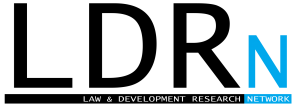The call for papers is now available for the LDRN 5th Annual Conference – “Challenges for Law and Development: Responses”.
The conference will be hosted at Nelson Mandela University, Port Elizabeth, South Africa on 21 – 23 September 2020.
Download the call for papers here and submit your proposal / expression of interest by 9 March 2020 via the conference website. Further details on conference logistics will also be made available on the conference website.
Sign up for the LDRN newsletter to receive conference announcements and updates!
____________________________________________


Call for Papers: LDRN 5th Annual Conference – “Challenges for Law and Development: Responses”, Nelson Mandela University, Port Elizabeth, South Africa, 21 – 23 September 2020
The world is confronting immense challenges that place strain on people’s way of life, legal systems and domestic mechanisms of governance. Although these challenges occur worldwide, they often impact most severely on people living in the Global South. They include climate change leading to crippling droughts, floods, bushfires and rising sea levels; sustainability; poverty and inequality; gender-based violence; state-based corruption and poor governance; the confiscation of indigenous lands; conflicts, including over land, the sea and natural resources; the dislocation and isolation of populations consequent upon these phenomena; human mobility; rampant xenophobia and racism; and widespread human rights violations. Untold pressure is placed on domestic institutions responsible inter alia for health care, education, housing, social welfare, and social protection, and concerns are raised about the rule and role of law, governance, and individual well-being. Scholars of law and development are justifiably concerned about these global realities, to be addressed as the Network’s annual conference takes place for the first time in the Global South.
The 5th Annual Conference of the LDRN will explore the meaning, causes and consequences of the challenges identified and seek to identify appropriate responses from legal systems and Law and Development researchers and practitioners. Participants are invited to contribute to two specific tracks.
The first track confronts the conceptual challenges in Law and Development scholarship. Participants are invited to consider how Law and Development can respond to the global challenges to ensure the field’s continuing viability and relevance. Additionally, are there separate southern and northern perspectives on Law and Development? How do we overcome the tension between such perspectives for the benefit of the global good?
The second track of the conference invites participants to consider the more specific global challenges facing Law and Development scholars and practitioners, divided into six sub-streams, as follows:
- Governance, human rights, and the rule of law – specifically, the protection of the rights to equality and dignity; the advancement of socio-economic rights, mainly in the Global South; the balance between civil, political and social rights; and the impact of poor governance and corruption on development and the rule of law.
- Environment, the law of the sea and development, sustainable development and climate change – participants are asked to consider the responses required to address the global environmental challenges identified in the call.
- Land – the protection of land rights; access to land; land reform; land conflicts; and the land rights of indigenous persons in both domestic and international law.
- Human mobility – participants are encouraged to consider the impact of human mobility on both domestic governance and dislocated peoples and to explore appropriate legal responses.
- Social protection – recognised in its extensive sense, as an issue of critical concern to societies both in the Global South and North, with participants considering the need for innovative approaches.
- International economic law and development finance – participants are asked to explore key challenges in international economic law and development finance and the responses needed to address poverty and inequality in the Global South.
As in prior conferences, we aim to promote a dialogue between scholars and practitioners from the Global South and North and especially welcome participants from the Global South.
SUBMISSIONS: We invite proposals for individual papers or panels on any topic or theme in the two tracks. Proposals for panel discussions should indicate potential participants. Proposals should contain an abstract of 200-300 words. Book launch panels are also invited.
DEADLINE: Proposals and expressions of interest should be submitted by 9 March 2020 via the conference website. Please note that you will first be asked to register on the website and then to submit your abstract.
CONTACT: Please submit your submissions via the landing page on the conference website. Questions may be addressed via the conference website or to Tanya.Stephens@mandela.ac.za
TRAVEL STIPENDS: A limited number of travel stipends for speakers based in the Global South are available. Applications should be submitted with proposals for papers or panels in accordance with the criteria published on the conference website.
DECISIONS on papers and panels will be announced by 30 April 2020.
FOR FURTHER INFORMATION on conference themes, submissions and stipends, please see the conference website.

